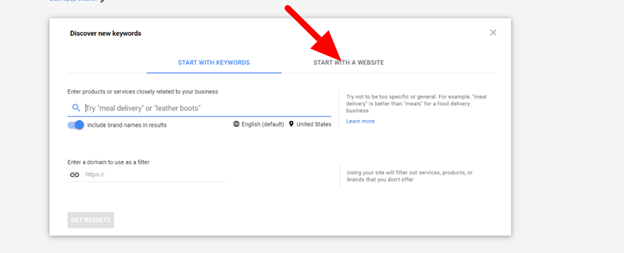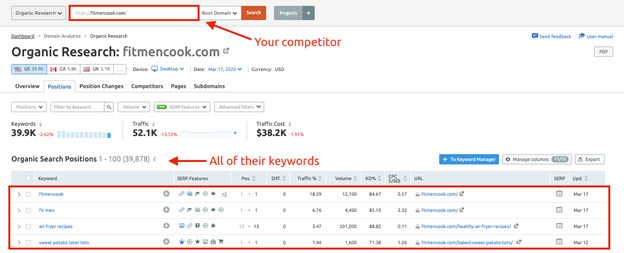How To Identify Competitor Keywords To Target
Keywords are the base of all successful Search Engine Optimization (SEO) campaigns.
However, getting the best keywords to drive traffic to your business often feels overwhelming. Especially if you’re short of time.
But it doesn’t have to be that way.
Have you tried mimicking the SEO strategy of your competitors? Doing a content gap analysis to take advantage of any keywords others haven’t noticed yet?
Such a method is a proven blueprint for SEO success! And the best part: you’ll not have to guess which keywords drive traffic and conversions.

This short guide is meant to enlighten you on a keyword research process that will help you gain a running start and lay a strong foundation for your content efforts and keyword research.
Let’s jump in…
What’s Competitor Keyword Research?
There are two main approaches to keyword research.
1. The Traditional Approach: This uses seed keywords to build a bigger set of related search queries that can be mapped to pages or posts on a site. Although this process works, it’s mostly about guesswork and lots of upfront legwork.
2. The Competitor Keyword Research Approach: Here, you reverse-engineer the keywords which are already driving an audience and conversions for your competitors. This lets you easily see the areas in which you are falling short so that you can sport crucial gaps in your site’s content strategy.
Below are some reasons why you should make competitor analysis the bedrock of your keyword research.
- There’s no need to reinvent the wheel – it’s easier to work with what’s already working for your top competitors.
- Helps you find new keyword opportunities easily by analyzing keywords that are ranking for your competitors that you hadn’t thought of.
- An easy time finding and filling crucial content gaps and updating your content to outrank the competition.
- You’ll readily know why the competition is beating you.
- You can find the terms that the competitors are bidding on during their PPC campaigns. By finding this, you can then create content around the topics.
- You’ll get lower competition long-tail keywords that you could add to your content calendar.
- You’ll find secondary keywords and featured snippet opportunities. Keywords trigger featured snippets and once you identify the topics triggering them, you’ll find it easy optimizing for placement.
Tools That Will Help You Figure Out your Competitors’ Keywords
- Google Keyword Planner Tool

In Google’s AdWords interface, you can access the Google Keyword Planner. This is a free tool that’ll help you achieve great results in your keyword research in just a few steps:
- Sign in to AdWords, locate the Keyword Planner in the interface, and look for the “Find new Keywords” option.
- Select the “Find New Keywords” option. This allows you to find keywords using a phrase, category, or the website that you intend to know which keywords it’s ranking for.
- Select the text field on the “Your Landing page” section and paste the competitor’s URL. Once you do, click on “Get Ideas.”
- Google will crawl the URL and give you a list of keywords related to the page and website as a whole.
- Once Google displays your results, click the tab named “Keyword ideas” below that graph to see the keywords that your competitor is ranking for.
- Your Competitor’s Website HTML Page Source
Get to your competitor’s website and select the page that you intend to find keywords in. Right-click on the page and toggle over to “Page Source.” A window will pop up with the HTML source code of that page.
In the code, find keywords in the title tag, meta description, image alt tags, and optional keywords tag. It’s worth noting that not all sites will have keywords tag, but it’s worth looking out for it.
- Screaming Frog Spider
The Screaming Frog software will help you do a simple SEO audit on the website of your competitor.
Download the tool to your computer and use it to crawl your competitor’s website in a similar way that search engines do. This will give you a log of details on the website, including image alt texts, metadata, heading texts, and anchor texts, among others. All these items point to keywords being targeted by your competitor.
- SEMRush

SEMRush makes a fantastic organic keyword research tool that can show you the ranking terms for close to all domains. Using this tool is as simple as keying in your competitor’s URL and finding keywords from the list that SEMRush provides you with.
Besides, the SEMRush tracker will also provide the URL that ranks for your competitor to help you further understand the pieces of their content marketing that are working best for them.
- BuzzSumo
BuzzSumo will add a cool twist to your competitor keyword research process by allowing you to look at it from a social and sharing point of view. By doing this, it “reverses” the competitive keyword research process.
Other than thinking about the keywords that your competitors use first, BuzzSumo allows you to start working with known keywords that matter to you. You can then see who else is also ranking for those terms. This tool will present the most liked, shared, and socially distributed content for the keywords you have.
By seeing the content that’s doing well, you’ll easily explore the pieces to better understand keyword types, variations, and nuances with the potential to work for you. It can also help you identify “new” competition to your business – that’s other sites that compete for those ranking keywords you care about.
More Tools
- Ahrefs keyword explorer
- FeedtheBot SEO Overview Tool
- Moz Keyword Difficulty and SERP Analysis Tool
- Moz Open Site Explorer
Final Thoughts
Above are just a few of our favorite tactics and tools for finding keywords that the competitors are ranking for.
Of course, you don’t want to spend all your time and resources trying to rank for each of your competitor’s keywords. Like most things with content and SEO, it’s crucial to be intentional and strategic with your decisions.
As you choose a tool to work with, try and understand your funnel, identify the right competitors to track, and prioritize the keywords that you ought to target.
About The Author
Marketing Team
The AOK Marketing Team is a diverse group of amazing individuals driven to help all of our clients succeed. Great people are everywhere, and we believe that people should control their workday, their work environment, and where they live. We have team members in 9 countries: United States, Canada, Egypt, Belgium, Ireland, Australia, India, Pakistan, and Hong Kong.
How can we help you?






